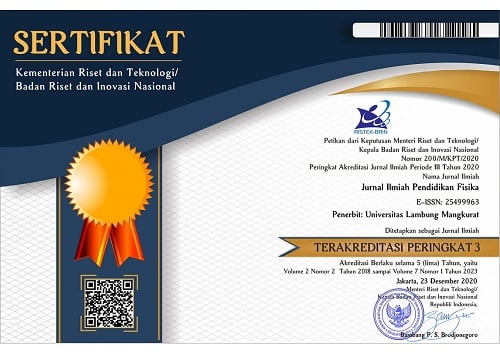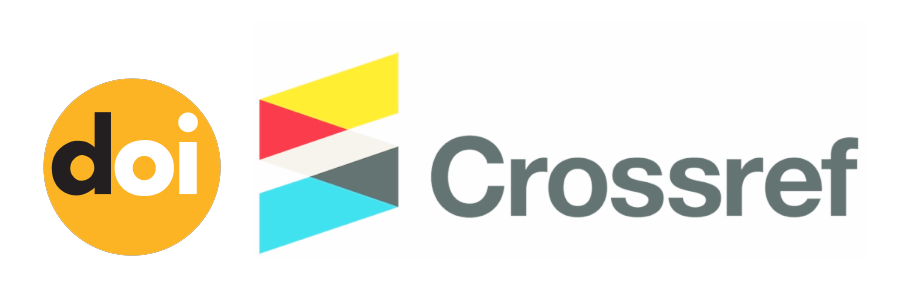Efektivitas Pembelajaran Daring dengan Metode Flipped Classroom Pada Matakuliah Farmasi Fisika
Abstract
Pembelajaran daring secara sinkron menghadapi beberapa tantangan dalam penerapannya seperti keterbatasan waktu dan gangguan internet. Penelitian ini bertujuan untuk menganalisis efektivitas metode flipped classroom pada pembelajaran daring terhadap prestasi belajar mata kuliah farmasi fisika. Penelitian ini adalah kuasi eksperimen menggunakan Post-test Only Design. Dua kelas kontrol dan dua kelas eksperimen pada mata kuliah farmasi fisika terlibat dalam penelitian ini selama satu semester. Kelas eksperimen dengan metode flipped classroom mendapatkan video rekaman dari modul materi dan tugas pada LMS Microsoft Teams sebelum kelas tatap muka daring. Hasil independent t-test menunjukkan perbedaan prestasi belajar yang positif dan signifikan untuk kelas eksperimen baik dari hasil post-test 1 (p=0,002; effect size=0,6) maupun hasil post-test 2 (p=0,008; effect size=0,5). Hasil kuesioner mahasiswa tentang metode flipped classroom mendapatkan skor 86,8% dibandingkan metode yang pembelajaran daring biasa. Kesimpulan yang diperoleh, pembelajaran daring menggunakan flipped classroom efektif meningkatkan prestasi belajar farmasi fisika dibandingkan pembelajaran daring biasa. Implikasi dari penelitian ini mendorong penggunaan metode flipped classroom untuk mengatasi beberapa keterbatasan pada pembelajaran daring biasa.
Synchronous online learning faces several challenges in its implementation, such as time constraints and internet disturbances. This study aims to determine the effectiveness of the flipped classroom method in online learning on learning achievement in Physical Pharmacy courses. This quasi-experimental research uses a Post-test Only Design. Two control classes and two experimental classes in the pharmaceutical physics course were involved in this research for one semester. The experimental class with the flipped classroom method got a video recording of the material and assignment module on the Microsoft Teams LMS before the online, face-to-face class. The independent t-test showed a positive and significant difference in learning achievement for the experimental class both from the results of posttest 1 (p=0.002; effect size=0.6) and posttest results 2 (p=0.008; effect size=0.5). The results of the student questionnaire about the flipped classroom method got a score of 86.8% compared to the conventional online learning method. The conclusion obtained is that online learning using flipped classrooms effectively improves Physical Pharmacy learning achievement compared to conventional online learning. The implications of this research encourage using the flipped classroom method to overcome some of the limitations of ordinary online learning.
Keywords
Full Text:
PDFReferences
Adnan, M., & Anwar, K. (2020). Online learning amid the covid-19 pandemic: Students’ perspectives. Journal of Pedagogical Sociology and Psychology, 2(1), 2020. https://doi.org/10.33902/JPSP
Akçayır, G., & Akçayır, M. (2018). The flipped classroom: A review of its advantages and challenges. Computers and Education, 126(August), 334–345. https://doi.org/10.1016/j.compedu.2018.07.021
Asiksoy, G., & Özdamli, F. (2016). Flipped classroom adapted to the ARCS model of motivation and applied to a physics course. Eurasia Journal of Mathematics, Science and Technology Education, 12(6), 1589–1603. https://doi.org/10.12973/eurasia.2016.1251a
Bhagat, K. K., Chang, C. N., & Chang, C. Y. (2016). The impact of the flipped classroom on mathematics concept learning in high school. Educational Technology and Society.
Bishop, J. L., & Verleger, M. A. (2013). The flipped classroom: A survey of the research. ASEE Annual Conference and Exposition, Conference Proceedings. https://doi.org/10.18260/1-2--22585
Cagande, J. L. L., & Jugar, R. R. (2018). The flipped classroom and college physics students’ motivation and understanding of kinematics graphs. Issues in Educational Research, 28(2), 288–307.
Cotta, K. I., Shah, S., Almgren, M. M., Macías-Moriarity, L. Z., & Mody, V. (2016). Effectiveness of flipped classroom instructional model in teaching pharmaceutical calculations. Currents in Pharmacy Teaching and Learning, 8(5), 646–653. https://doi.org/10.1016/j.cptl.2016.06.011
Dash, S. (2019). Google classroom as a learning management system to teach biochemistry in a medical school. Biochemistry and Molecular Biology Education. https://doi.org/10.1002/bmb.21246
Faqir, A. Al. (2020). Kemendikbud Catat 646.200 Sekolah Tutup Akibat Virus Corona.
González-Gómez, D., Jeong, J. S., Airado Rodríguez, D., & Cañada-Cañada, F. (2016). Performance and Perception in the Flipped Learning Model: An Initial Approach to Evaluate the Effectiveness of a New Teaching Methodology in a General Science Classroom. Journal of Science Education and Technology. https://doi.org/10.1007/s10956-016-9605-9
Kementerian Pendidikan dan Kebudayaan RI. (2020). Surat Edaran Direktur Jenderal Pendidikan Tinggi Republik Indonesia Nomor 1 Tahun 2020 tentang Pencegahan Penyebaran Corona Virus Disease ( Covid-19) di Perguruan Tinggi. 1–2.
Moore, J. L., Dickson-Deane, C., & Galyen, K. (2011). E-Learning, online learning, and distance learning environments: Are they the same? Internet and Higher Education, 14(2), 129–135. https://doi.org/10.1016/j.iheduc.2010.10.001
Sahin, A., Cavlazoglu, B., & Zeytuncu, Y. E. (2015). Flipping a college calculus course: A case study. Educational Technology and Society.
Xu, D., & Jaggars, S. S. (2013). The impact of online learning on students’ course outcomes: Evidence from a large community and technical college system. Economics of Education Review, 37, 46–57. https://doi.org/10.1016/j.econedurev.2013.08.001
Zawilinski, L. M., Richard, K. A., & Henry, L. A. (2016). Inverting Instruction in Literacy Methods Courses: Making Learning More Active and Personalized. Journal of Adolescent and Adult Literacy. https://doi.org/10.1002/jaal.498
DOI: https://doi.org/10.20527/jipf.v6i1.4320
Refbacks
- There are currently no refbacks.
Indexed by: Jurnal Ilmiah Pendidikan Fisika is licensed under a creative commons attribution-share alike 4.0 international license
Statistics Counter |

















